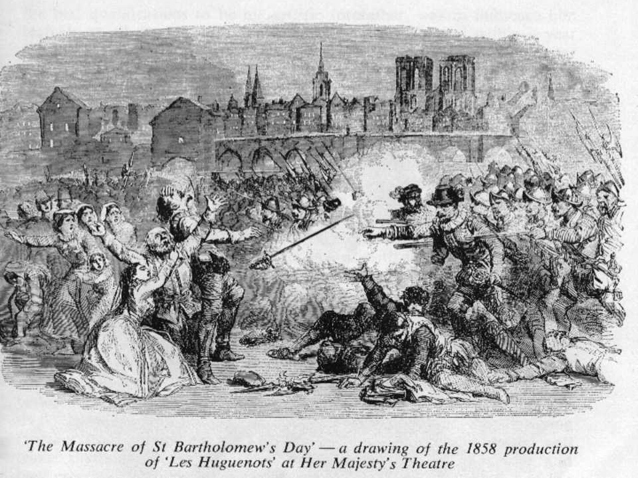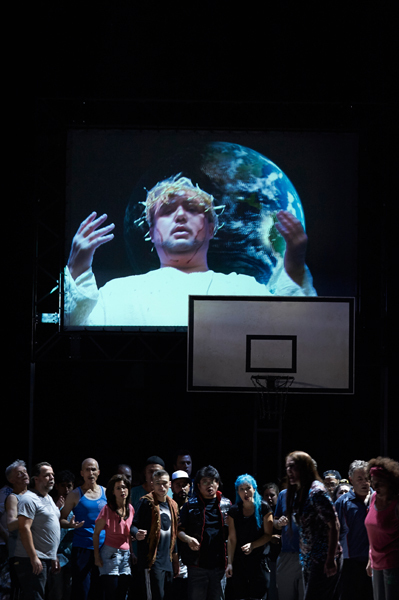A look at the rise, fall and slow resurgence of the work of the most successful composer on the 19th century stage, Giacomo Meyerbeer, a story which takes in changes in style, personal spite and anti-Semitism.
 |
| Meyerbeer's Les Huguenots at Her Majesty's Theatre, London in 1858 |
Later in the century, in the 1880s, the great Polish tenor Jean de Reske would be performing Raoul in Les Huguenots and Jean in Le Prophete alongside Walther in Die Meistersinger, the title role in Lohengrin, Romeo in Gounod's Romeo et Juliette and the title role in Gounod's Faust. But by the late 1890s, de Reske was performing the Gounod roles alongside Wagner (including The Ring), but no Meyerbeer.
A similar thing happened in France. In 1890, the year before the Paris premiere of Wagner's Lohengrin, there were no Wagner performances at the Paris Opéra, and 32 performances of Meyerbeer's four grand operas. In 1909, there were 60 Wagner performances, and only three of Meyerbeer (Les Huguenots being the sole work performed).
What happened?
 |
| Meyerbeer's Le Prophete in Karlsruhe (photo Matthias Baus) |
Despite his name Giacomo Meyerbeer was German, of Jewish birth, born Jacob Liebmann Beer in wealthy Berlin family. Following studies in Italy he had a number of operas premiered in Italy before moving to Paris. And it is in Paris where his French grand operas were such a success.
First, it is perhaps useful to consider the era in which Meyerbeer was born, and look at the other composer whose life ran parallel to his. Meyerbeer was born in 1791 and died in 1864. Rossini was born in 1792 and died in 1868. Thus the two were born within a year of each other and both lived long lives. But Rossini's output dates from 1812 to 1829, whilst Meyerbeer's French grand operas date from 1831 to 1864, so though the two are the same age, their composing careers are very different.
There are a lot of parallels between Meyerbeer's French grand operas and the serious operas of Rossini. For a start, Rossini re-wrote his Italian opera seria to create French versions. Rossini fell out of fashion like Meyerbeer, by the early 20th century Rossini's output in opera houses was restricted to his comedies. The operas of both composers are difficult to cast due to their technical virtuosity, and only now is it relatively easy for opera houses to do so. It has required the re-discovery of early 19th century vocal technique to allow Rossini's serious operas to be re-discovered. Similarly Meyerbeer's operas require powerful vocal technique.
But Meyerbeer was far less of an innovator than Rossini, we can take Rossini's opera serias written for Naples (nine altogether) and admire them for their theatrical / musical daring and invention, without having to worry about the exact nature of their dramatic presentations at the Teatro di San Carlo. But Meyerbeer's operas are intimately bound up with a particular operatic convention, that of French Grand Opera, which combines music, use of large orchestra and chorus, with striking visuals, elaborate staging and ballet, all usually in an historical setting. Very much gesamkunstwerk before Wagner, and unfortunately Meyerbeer was a synthesizer rather than an innovator. His music does not always leap out at you, it is the dramatic whole which strikes, and his operas are at their best in the theatre.
 |
| Meyerbeer's Les Huguenots in Strasbourg (photo Alain Kaiser) |
We can only speculate what Rossini would have written for the opera house if he had continued, but Meyerbeer seems to have been content to create more of the same. When the young Verdi, in Paris in the late 1840s for the premiere of Jerusalem, heard Meyerbeer's Le Prophete at the Paris Opera he was unimpressed. Yet Verdi was similarly affected by the concept of French Grand Opera, his first version of Don Carlos was very much Verdi creating his own version of this style (despite it starting to go out of fashion), and Verdi's later operas were affected by the larger scale, historical sweep and bigger casts of the French Grand Operas.
So, style comes into it and as the 19th century progresses and turns into the 20th, opera houses espouse the later operas of Verdi and Wagner, Verdi's Otello replaces Rossini's, Wagner's Ring replaces Meyerbeer's operas.
 |
| Meyerbeer's Vasco da Gama at the Deutsche Oper, Berlin (using a brand new edition of L'Africaine) |
But Meyerbeer refused Wagner a loan in 1846, and in Paris in 1849 Wagner was very envious of the immense popularity of Meyerbeer's operas. Wagner's ideas of music drama also developed, and unfortunately the writings from the 1850s on music drama which heavily influenced creation of The Ring, are paralleled with the anti-semitic writings. Opera as Drama (1852) includes the memorable put down 'effects without causes', as well as a swipe at the banking background of Meyerbeer's family.
It wasn't just Wagner, though, Robert Schumann's reaction to Les Huguenots has the suggestion of anti-Semitism, 'Time and time again we had to turn away in disgust...One may search in vain for a sustained pure thought, a truly Christian sentiment...It is all contrived, all make believe and hypocrisy!...The shrewdest of composers rubs his hands with glee.' Whilst Mendelssohn thought Robert le Diable was 'ignoble.
It all added up, by 1898 George Bernard Shaw (in The Perfect Wagnerite) commented, '
'Nowadays young people cannot understand how anyone could have taken Meyerbeer's influence seriously'.
 |
| Meyerbeer's Les Huguenots at Bard Summerscape with Marie Lenormand as Urbain |
The operas are still tricky to cast, and there is also their length. As with many things, Wagner certainly did not invent long hours in the theatre. Uncut Meyeerbeer's operas are substantial things, in five acts with nearly four hours of music (there are similar problems with other French Grand Operas like Halevy's La Juive and Verdi's original Don Carlos).
What we still lack are good recordings of decent editions of the works. It is not that the catalogue lacks recordings, but for instance the two classic recordings of Les Huguenots (Richard Bonynge's with Joan Sutherland, Martina Arroyo and Anastasios Vrenios on Decca, Cyril Diederich's with Gylaine Raphanael, Francoise Pollet and Richard Leech on Warner Classics) both have cuts in them. And there is still only one major recording of Le prophete, Henry Lewis's with James McCracken, Marilyn Horne and Renata Scotto on Sony.
No-one is doing for Meyerbeer what Opera Rara is currently doing for Donizetti's French Grand Operas, there are now fine Opera Rara recordings of Donizetti's Dom Sebastien, Les Martyrs (in an excellent re-construction of the original full score) and Le duc d'Albe with L'ange de Nisida promised. What we lack is something similar for Meyerbeer's French operas.
 |
| Meyerbeer's Le Prophete in Karlsruhe (photo Matthias Baus) |
- Auber La muette de Portici (1828) - the work which essentially codified French Grand Opera
- Rossini Guillaume Tell (1829) - Rossini's only opera written specifically for the Paris Opera
- Meyerbeer Robert le Diable (1831)
- Auber Gustave III, ou le bal masque (1833)
- Halevy La Juive (1835)
- Meyerbeer Les Huguenots (1836)
- Halevy Guido et Ginevra (1838)
- Donizetti L'ange de Nisida (1840, unperformed)
- Donizetti La favorite (1840)
- Donizetti Le duc d'Albe (1839/40, unfinished)
- Donizetti Les Martyrs (1840)
- Halevy La reine de Chypre (1841) - praised by Wagner
- Donizetti Dom Sebastien (1843)
- Verdi Jerusalem (1847)
- Meyerbeer Le prophete (1849)
- Auber L'enfant prodigue (1850) - Auber's last major grand opera
- Verdi Le vepres siciliennes (1845)
- Meyerbeer L'Africaine (1865) - produced posthumously in an edition by Fetis
- Verdi Don Carlos (1867)
There are at least three new productions of Meyerbeer's operas in 2017/18. In Berlin, the Deutsche Opera performs Le prophete, in Budapest the Hungarian State Opera performs Les Huguenots and Opera Frankfurt perform L'Africaine.
Elsewhere on this blog:
- Debut recital: Luc Robert in Verdi arias - CD review
- Riveting and exciting: Die Meistersinger from Bayreuth - Opera review
- Magnificent staging: Wagner's Parsifal at Bayreuth - Opera review
- Viola & accordion: Duo van Vliet's Lachrymae ReVisited - CD review
- Powerful, compelling, satisfying: Tristan und Isolde at the Bayreuth Festival - opera review
- An eventful morning in East London: 21st Century violin concertos - CD review
- Bach in context: St John Passion & Lutheran Vespers at the BBC Proms - concert review
- Large scale beauties: Schoenberg's Gurrelieder at the BBC Proms - concert review
- Singing Wagner: A continuation of our conversation between Claire Rutter and Dame Anne Evans - interview
- Dark and complex: Saint-Saens Samson et Dalila at Grimeborn - opera review
- Jazz influence and stylistic virtuosity: Piano music of Daryl Runswick - CD review
- Oh what a remarkable score!: Rogers and Hamerstein's Oklahoma! at the BBC Proms - Concert review
- Home











No comments:
Post a Comment